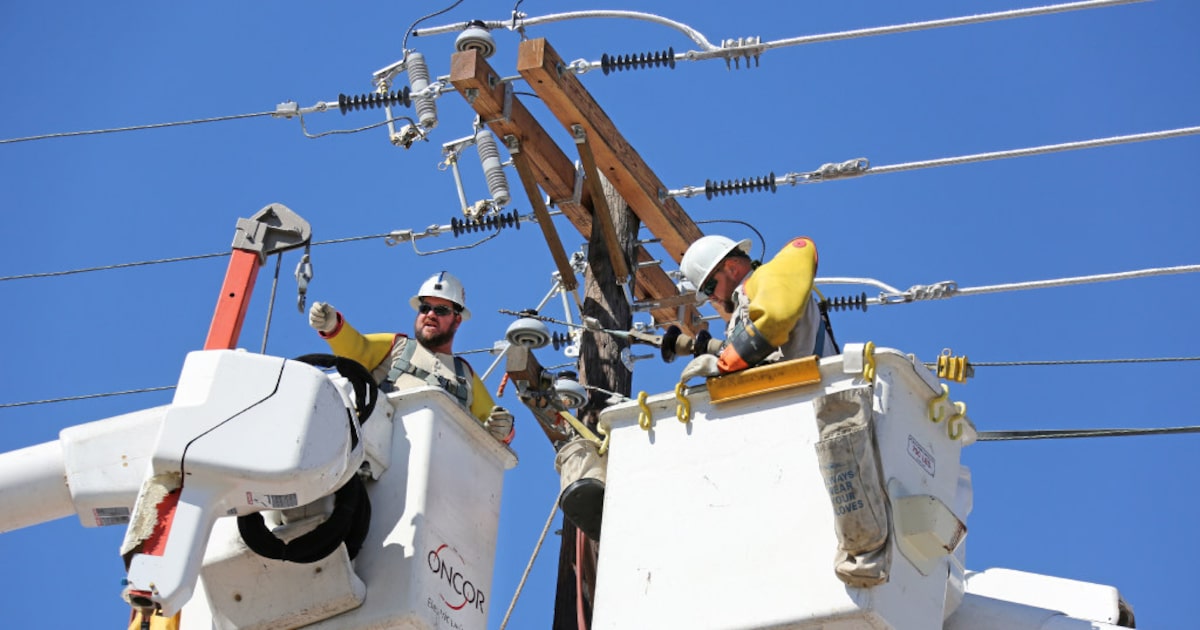Multiple municipalities across Dallas-Fort Worth have voted to oppose a request from Oncor that could increase an average residential electric bill by about $7.90 per month.
Oncor, the largest energy delivery company in Texas, filed a rate review in June with the Public Utility Commission of Texas, requesting a rate hike due to several factors like explosive growth across the state, record levels of construction, and the impact of extreme weather.
The proposed rate is 12.3% for residential and 51% for street lighting, according to documents presented at city meetings. The higher rates would increase Oncor’s revenue $834 million, a roughly 13% uptick.
State law allows that every four years an electric utility, like Oncor, can file a comprehensive rate case with the PUCT to increase customer rates and recover capital costs, like costs to build transmission lines or other infrastructure improvements.
Business Briefing
It’s typical for the Oncor Cities Steering Committee, a coalition of more than 170 cities in the utility’s service area, jointly intervene in these types of PUCT proceedings. Part of that process includes member cities passing a resolution denying the rate increase.
In the last few weeks, councils in cities like Arlington, Colleyville, Fort Worth, Hurst, Plano and Prosper have done just that.
It’s standard that attorneys representing the steering committee meet with Oncor and PUCT staff to discuss the specifics of the filing, and try to reach an agreement on the proposed rate increasing, potentially reducing the initial requested amount.
In some previous rate cases, the group reached a settlement and the matter was sent to the PUCT for final approval.
In an emailed statement, Oncor officials said rate reviews are part of a routine, regulated process governed by law and PUCT rules.
“Oncor appreciates the thoughtful input we have received from our city partners as part of this process,” the statement reads. “We will continue to work with impacted parties as the rate review progresses.”
The last time Oncor filed for a base rate adjustment similar to this was May 2022, with the final order authorizing that rate change being issued in April 2023.
‘We could strengthen the grid’
In light of the proposed rate increase, the Texas Advanced Energy Business Alliance recently commissioned a study. The organization found that Oncor customers could save $8.5 billion over the next 10 years, if the utility integrated more distributed energy resources into its system planning and operations, the group announced last week.
The study concluded that including customer-owned technologies such as household solar and battery storage, electric vehicles and smart appliances in the utility’s grid planning and ERCOT’s market operations could save every Oncor customer roughly $279 per year while avoiding “unnecessary” grid expansion.
Matt Boms, TAEBA executive director, said instead of Oncor requesting an increased rate, it should be paying attention to solutions that could cut bills.
“For Oncor, the message is open in the playbook,” Boms said. “Share your grid maps, show us where local energy can connect efficiently to the grid and where it’s needed the most. Let local energy compete with traditional spending on poles and wires, where it might be cheaper or faster to integrate distributed resources and then streamline the approvals.”
Boms said distributed energy resources are proven technologies that give Texans more independence and resilience, especially during extreme weather.
“[Distributed energy resources] have all been around for several years now, and there’s really not a good reason for utilities to be dragging their feet when it comes to interconnecting these technologies,” Boms said.
adding: “We could strengthen the grid and make it more reliable, but only if we let innovation work. My message would be, it’s time to stop building those barriers and build a little bit smarter. We didn’t have these solutions 15, 20 years ago, but they’re certainly making a difference now.”
In an emailed statement, Oncor officials said it does work with customers interested in leveraging the technologies.
“As a transmission and distribution utility, and not a generator or market operator, Oncor works cooperatively with customers across our system who are interested in leveraging Distributed Energy Resources,” the statement reads. “We consistently provide resources and information to residential and small commercial customers, installers, and developers with large distributed generation systems throughout the interconnection process.”
The utility noted it also supports long-term innovative research opportunities, including participating in ERCOT’s Aggregate Distributed Energy Resource Pilot Project and, like TAEBA and other market participants, has actively taken part in the PUCT rulemaking projects regarding distributed energy resources.
Headquartered in Dallas while serving more than 400 communities in 98 counties, Oncor maintains more than 144,000 miles of transmission and distribution lines throughout Dallas-Fort Worth and Midland-Odessa.
Staff writer Phillip Jankowski contributed to this report.
 D-FW-based FiberLight announces $150M investment to expand its network across West Texas
D-FW-based FiberLight announces $150M investment to expand its network across West Texas
CEO Bill Major said fiber and connectivity services are critical infrastructure.
 With NFL’s trade deadline looming, Cowboys’ Jerry Jones talks natural gas instead
With NFL’s trade deadline looming, Cowboys’ Jerry Jones talks natural gas instead
Jones took some time to discuss the prospects of one of his other business ventures, Comstock Resources.
This reporting is part of the Future of North Texas, a community-funded journalism initiative supported by the Commit Partnership, Communities Foundation of Texas, The Dallas Foundation, the Dallas Mavericks, the Dallas Regional Chamber, Deedie Rose, Lisa and Charles Siegel, the McCune-Losinger Family Fund, The Meadows Foundation, the Perot Foundation, the United Way of Metropolitan Dallas and the University of Texas at Dallas. The News retains full editorial control of this coverage.

